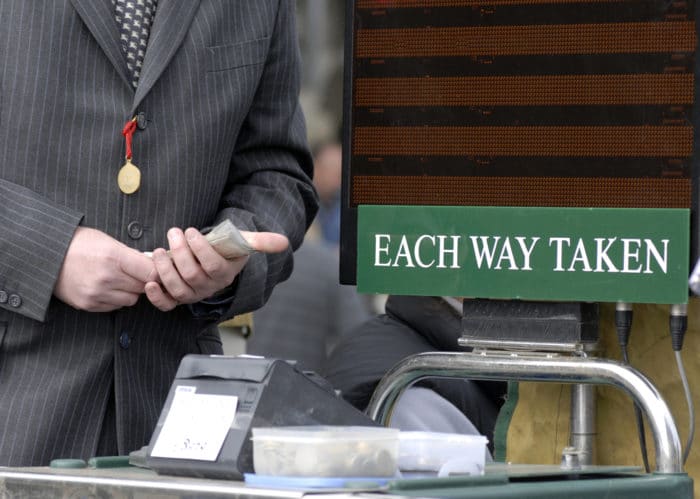Why We Love It
-
$26,170Potential Avg. Salary
-
3.5%Job Growth Rate
-
Growing DemandJob Outlook
-
Deal MakingCareer Attribute
Bookmakers are individuals who facilitate bets, often on sporting events. More commonly referred to as bookies, bookmakers earn a living by collecting bets on odds that guarantee leftover profits after all winnings are paid. Working as a bookie can be risky—it’s a gambling profession and not legal in all areas.
Recommended Schools
What is a Bookie?
The following job responsibilities are common for individuals in bookie roles:
- Facilitate and collect bets on sporting and other events
- Set odds for bets that guarantee profits regardless of which team wins
- Record all bets in order to provide payouts to winners
- Submit payments for winning bets
A Day in the Life of a Bookie
Bookmakers—more commonly referred to as bookies—are bet facilitators. They commonly accept bets for sporting events, but they may accept bets for other types of events or outcomes as well. Much like stock brokers, bookies assume a certain amount of risk. They make a living by setting odds that—hopefully—guarantee the bookie makes a profit after all winnings are paid. However, miscalculations or mistakes when setting odds or unexpected favor for a certain team can result in no profits or even loss.
A simple explanation for how a bookie work is as follows. Two teams—team A and team B—are competing, and both teams have a 50% chance of winning. The bookie offers 1/2 odds on either team winning and accepts bets of $100. Winners are paid $150, and losers receive no money. If the bookie accepted 10 bets for the winning team and 10 for the losing team, he/she collected $2,000. The bookie pays $1,500 out to the winning bets and is left with a $500 profit. The odds are known as vigorish, or vig.
Some bookies establish odds themselves, and some work with odds compilers—mathematicians and risk analysts that help determine how to set odds in a way that guarantees profitability. If a bookie or odds compiler makes a mistake, the bookie can lose a lot of money—working as a bookie is similar to gambling for a living and carries much of the same risk. Additionally, betting with bookies and working as a bookie is not legal is all areas and states of the U.S., so bookies need to be familiar with state laws.
Typical Work Schedule for Bookies
Bookies often work in evenings and on weekends when sporting events are commonly hosted. Most are self-employed, choose their own schedules, and are able to work as frequently or infrequently as they want.
Typical Employers
Bookies are rarely—if ever—hired to work as employees of a business. Most bookies are self-employed and offer their services on a freelance basis to a specific list of clients.
Recommended Schools
How To Become a Bookie
The process of becoming a bookie is really flexible. Because bookies are mostly self-employed, there are no formal credentials required. However, the more education a bookie has in the field, the more likely he/she will be to make money working as a bookie. With that understanding, there are a few different things you can do to learn the best practices of working as a bookie, learn how to market your services to receive more bets, and learn how to set odds in a way that enables you to earn more often than lose.
A degree or coursework in a mathematics major can be really helpful if you plan to set your own odds rather than working with an odd compiler. Coursework in finance, statistics, and advanced algebra and calculus can help you learn how to predict the odds of different outcomes and collect bets in a way that will leave you with a profit after paying out all winnings. Coursework in computer sciences can be helpful for using programs to collect and record bets, and marketing classes can help promote services.
You’ll also need to educate yourself on the laws of the areas where you plan to operate. Collecting bets illegally can result in hefty penalties and even jail time for both you and your customers. Once you have a good plan for profitability and are sure you are operating legally, you can begin building your customer base. You can do this initially by setting up services in bars that feature sporting events. Over time, your customer base should grow through word-of-mouth referrals, and you will be less dependent on bars.
Bookie Salary Data
We’ve provided you the following to learn more about this career. The salary and growth data on this page comes from recently published Bureau of Labor Statistics data while the recommendations and editorial content are based on our research.
National Anual Salary
Low Range
$18,820Average
$26,170High Range
$42,640National Hourly Wage
Low Range
$9/hrAverage
$13/hrHigh Range
$21/hrHow do Bookie salaries stack up to other jobs across the country? Based on the latest jobs data nationwide, Bookie's can make an average annual salary of $26,170, or $13 per hour. This makes it an Above Average Salary. On the lower end, they can make $18,820 or $9 per hour, perhaps when just starting out or based on the state you live in.
Salary Rankings And Facts
#758 Nationally for All Careers
Highest Education Among Bookies
- 0.2% Doctorate
- 1.3% Masters
- 12.6% Bachelors
- 9.9% Associates
- 32.6% College
- 32.5% High School
- 10.8% Less than High School
Job Growth Projections and Forecast
2014 Total Jobs
11,5002024 Est. Jobs
11,900Job Growth Rate
3.5%Est. New Jobs
400How does Bookie job growth stack up to other jobs across the country? By 2024, there will be a change of 400 jobs for a total of 11,900 people employed in the career nationwide. This is a 3.5% change in growth over the next ten years, giving the career a growth rate nationwide of Below Average.
Growth Rankings And Facts
#502 Nationally for All Careers
What Companies Employ The Most Bookies
| Industry | Current Jobs | New Jobs Needed | % Increase |
|---|---|---|---|
| Spectator sports | 4,300 | 200 | 0% |
| Gambling industries (except casino hotels) | 2,300 | 100 | 0% |
| Civic and social organizations | 1,600 | --- | --- |










